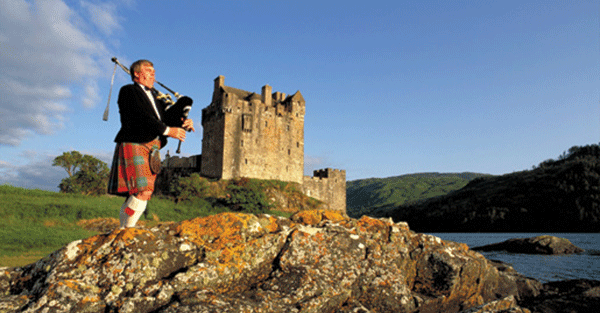September 9, 2014
Santiago, Chile
Anyone who’s ever seen the movie Braveheart has heard of William Wallace, one of the original heroes of Scottish independence.
Though Mel Gibson’s highly fictionalized account was one of the most historically inaccurate movies in modern cinema, Wallace did, in fact, lead Scottish rebels against English invaders. And he died for his cause.
Wallace was severely tortured after being convicted of high treason against King Edward I; he was dragged by horses, hung nearly to the point of death, revived, relieved of his manhood, ritualistically disemboweled, made to watch his entrails set ablaze… then finally beheaded.
Not the way you want to go.
That said, the movement for Scottish independence lived on, and England folded in 1357, ending a 60-year war between the two nations.
For the next 350 years Scotland remained an independent state until… go figure… a financial crisis.
In a desperate attempt to become (almost overnight) a major world trading power in the 17th century, the government of Scotland backed a comically ill-fated attempt to colonize Panama.
It failed miserably. Yet the investment in the Darien Scheme (as it was known) amounted to up to half of Scotland’s total money supply.
When it went bust, Scotland was nearly broke.
There had already been a push to reunify with England for some time. And with the country’s economy in shambles, unification seemed like a good move.
Today Scotland again finds itself debating the question of its independence, fueled once more by economics.
It’s easy to point to a number of different causes of rebellion, revolution, and dissent. But ultimately it’s economics that matter more than anything else.
When times are good and everyone is prosperous, few people want to rock the boat. No one has an incentive to change the system when it’s working so well.
Only when the prosperity begins to collapse do people have a strong motivation to change the status quo.
Suddenly the jobs are less plentiful, the taxes are higher, the standard of living is lower, and the costs are greater. And people demand change.
The greater the pain, the greater the desire to shake things up. And it’s happening across the world.
In Europe, separatist and extreme parties are gaining ground on the heels of an economic depression that has besieged the continent for several years now.
In France, Spain, Italy, Greece, etc., people are fed up with the current state of affairs, and they are agitating to split off from their current political leadership.
Likewise, Scottish voters are going to the polls in just over a week to decide if they should break away from the UK.
And from the looks of things, the independence movement has a very strong chance of winning.
Whenever major changes happen, this brings opportunities as well.
For example, a newly independent Scotland would create its own tax and corporate laws, potentially providing a number of major incentives to attract foreign talent and productive companies.
A Scottish passport would also be attainable for many people. Some basic guidance has already been issued:
British citizens living in Scotland on day one of independence, plus Scottish-born British citizens living outside Scotland, would be automatically considered Scottish citizens.
After independence, children born in Scotland, and children born outside Scotland to at least one Scottish parent, will be automatically considered to be Scottish citizens.
A person who has a parent or grandparent eligible for Scottish citizenship, will be able to register as a Scottish citizen by descent.
Scotland will also allow dual citizenship, so no one would have to renounce his/her existing citizenship.
Presuming the independence movement wins, Scottish citizens will be able to apply for a Scottish passport from day one of independence.
People will be able to continue using their existing UK passport until it expires. They can then choose to get a Scottish passport when their existing passport is due for renewal.
Scotland’s Future sets out that Scotland will remain part of the Common Travel Area between the nations of the British Isles, which means that the Scots won’t need a passport to travel to the rest of the UK or Ireland.
These are exciting times and this once again illustrates that there are opportunities hidden within every crisis.
We’ll be carefully following the results of this event and will have more details for our premium members as things unfold.








